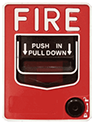Video MGMT System
 Access Control
Access Control
Voice & Data Wiring
 Burglar Alarm
Burglar Alarm
 Fire Alarm
Fire Alarm
Video MGMT System
Voice & Data Wiring
THOUGHT CENTER > Blog > Security Cameras
December 13, 2023
Too busy to read? Here’s a summary:
According to a survey conducted by Forbes, 90% of small business retailers nationwide have experienced theft at their stores, and 83% said they believe retail theft is at least a somewhat major issue. Numbers like these highlight the critical need for effective security measures, including surveillance monitoring.
But this brings us to an important question: Do businesses need to post that they have security cameras? Well, sometimes.
Keep on reading to find out when to notify customers, guests, and staff and when you can stay mum.
This may sound like a dry subject, but come along with me! It’ll be fun!
Businesses must be aware of their legal obligations. Different states and countries have varying laws regarding surveillance, but a common thread is respect for an individual's reasonable expectation of privacy.
Generally, in public areas where there's no expectation of privacy, such as store aisles and restaurants, using security cameras without explicit signage is likely to be legal.
However, extra signage or nonmandated notifications are a good idea. They enhance the deterrence effect of cameras and provide extra legal safeguards for monitoring.
Regarding camera privacy laws in Connecticut, employees must be notified of all electronic surveillance that isn’t in publicly facing areas.
Even if such notification isn’t required in your jurisdiction, notification is a good idea to maintain trust and transparency.
Employees should be informed about surveillance to maintain a positive work environment. This is where clear signage or notifications become essential.
U.S. employers must never install security cameras in bathrooms, changing rooms, and similar personal areas. Those who do install cameras in areas where people are likely to remove clothing face the risk of breaking voyeurism laws.
As an all-party consent state for electronic audio recording, Connecticut requires the consent of all individuals who are audio-recorded.
This stricter requirement is in place because audio surveillance is likely to collect far more personal information than video-only surveillance. In fact, security cameras should have their audio recording features disabled in almost all cases.
When you put up signs, make sure they’re clear and visible.
Place signs at entrances and in areas where surveillance is active. This not only covers most legal bases but also reinforces the message that your premises are well-protected.
Make sure the signs you post look new. New signs indicate new security systems.
On the other hand, faded security signs may indicate to savvy criminals that your business has an old security system that lacks the most effective security features of today’s camera systems—features like remote monitoring, high-resolution evidence capture, and proactive mobile alerts that raise the likelihood that intruders and other bad actors will be apprehended by law enforcement.
Every business is unique, and so are its security needs.
Consider factors like the nature of your business, the layout of your premises, and local laws when deciding on your surveillance strategy.
It’s always a good idea to consult with security professionals. They can provide tailored advice and help you navigate the complex world of surveillance laws and best practices.
If you’re looking to beef up your business security or need advice on surveillance practices, don’t hesitate to reach out to our team here at Mammoth Security. We’re here to help you make your business safer and more secure. For a free site survey and consultation, just click to contact us and fill out the brief form.
NOT COMPLETELY SURE?
860-748-4292Businesses don't always have to post signs for security cameras, especially in public areas with no expectation of privacy, like store aisles. However, posting signs can enhance deterrence and provide legal safeguards.
Legal requirements for surveillance in employee areas vary by location. In some places, like Connecticut, employees must be notified about electronic surveillance in non-public areas. It's always a good idea to maintain transparency with employees regarding surveillance.
It is illegal for U.S. employers to install security cameras in bathrooms, changing rooms, and similar personal areas. Doing so risks breaking voyeurism laws and invading personal privacy.
When implementing a business security camera system, consider the nature of your business, the layout of your premises, and local laws. Tailoring your approach to these factors is crucial for effective surveillance.
Businesses can enhance the effectiveness of their security cameras by placing clear, visible signs at entrances and surveillance areas and ensuring their security system includes features like remote monitoring and high-resolution evidence capture.
According to Forbes, 90% of small business retailers have experienced theft, highlighting the critical need for effective security measures like surveillance monitoring.
Audio surveillance is likely to collect more personal information than video-only surveillance. In all-party consent states like Connecticut, audio recording requires the consent of all recorded individuals.
Disabling audio recording features on security cameras is advisable to avoid collecting excessive personal information and to comply with stricter legal requirements for audio surveillance.
Consulting with security experts can provide businesses with tailored advice, helping them navigate the complex world of surveillance laws and best practices for their unique security needs.